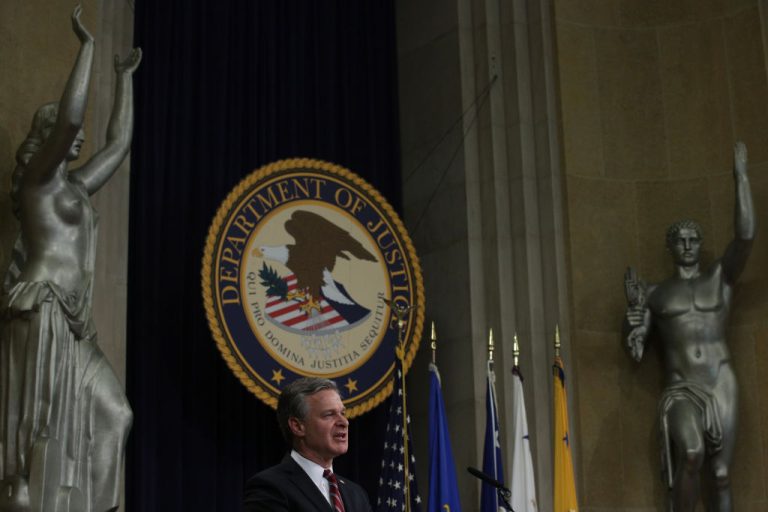A peculiar case of the Biden administration potentially bullying an investigative journalist into hiding has emerged, according to research conducted by one of America’s longest running magazines.
The story of former ABC News correspondent James Gordon Meek hit the tape of Rolling Stone on Oct. 18 as the outlet went into the details of a heavily armed federal raid on the journalist’s personal apartment that went almost entirely unreported in the media.
According to the timeline, on April 27, a witness spoken with recounted the tale of how blacked out utility vehicles combined with unmarked armored tactical vehicles commonly used by the Federal Bureau of Investigation and cruisers from the Arlington County PD descended on Meek’s apartment complex.
MORE ON THE NATIONAL SECURITY APPARATUS
- How the Pentagon Handles a ‘Clandestine Army’ of Ground Agents and Online Influencers ‘Ten Times the Size’ of the CIA
- Twitter Has Onboarded at Least a Dozen FBI and Intelligence Agents Since 2019
- Post Office Law Enforcement Arm Being Used to Surveil Internet for Right-Wing Content
“After just 10 minutes, the operation inside the Siena Park apartment complex — a six-story, upscale building for D.C. professionals, with rents fetching about $2,000 to $3,000 a month — was over,” author Tatiana Siegel wrote.
Success
You are now signed up for our newsletter
Success
Check your email to complete sign up
An FBI spokesperson confirmed to Rolling Stone that agents were in the exact area that morning “conducting court-authorized law-enforcement activity,” but refused to provide any further information.
“Meek has been charged with no crime. But independent observers believe the raid is among the first — and quite possibly, the first — to be carried out on a journalist by the Biden administration,” the article stated.
The details surrounding the who and why of the case are spartan to the point of non-existence, however.
Meek, who was ABC’s “national-security investigative producer” and an Emmy Award winner, happened to tweet the same morning only a one word reply to a retired CIA officer on the topic of how the U.S. Intelligence Community had been happily collecting information on Russia’s strategic and tactical warfare approaches as far back as the 2014 U.S.-orchestrated Maidan Revolution.
The word “Facts:” was the last thing Meek tweeted.
One day prior, however, the now-former journalist made a comment on the blunderous Afghanistan withdrawal captained by Joe Biden that led to the President’s open mockery by the Taliban, an enormous U.S.-gathered database of Afghani biometric data falling into the hands of Islamic terrorists, and the loss of 13 U.S. soldiers after a suicide bomber hit the crowded Kabul Airport in the midst of the chaos of evacuation.
This point may be more notable in light of a key point Rolling Stone buries three quarters of the way through the article:
“Even stranger, in the months before he vanished, Meek was finishing up work on a book for Simon & Schuster titled Operation Pineapple Express: The Incredible Story of a Group of Americans Who Undertook One Last Mission and Honored a Promise in Afghanistan, which he co-authored with Lt. Col. Scott Mann, a retired Green Beret.”
On the Wikipedia page for “Task Force Pineapple,” described as a “task force set up by a volunteer group of U.S. veterans to evacuate American citizens, as well as Afghan allies and their families, following the Taliban’s takeover of Afghanistan,” notably, one of Meek’s own articles is cited as a source.
The Aug. 27 article titled US Special Operations Vets Carry Out Daring Mission to Save Afghan Allies explained, “The Pineapple Express’ mission was underway Thursday when the attack occurred in Kabul. A suicide bomber believed to have been an ISIS fighter killed at least 13 U.S. service members — 10 U.S. Marines, a Navy corpsman, an Army soldier and another service member — and wounded 15 other service members, according to U.S. officials.”
Meek’s article noted that the Pineapple Express participants, and potentially those they shuttled to the Airport under the supposed safety of the U.S. military, were also harmed in the attack, “There were wounded among the Pineapple Express travelers from the blast, and members of the group said they were assessing whether unaccounted-for Afghans they were helping had been killed.”
The raid was especially egregious, Rolling Stone noted, because it would have required the signature of U.S. Deputy Attorney General Lisa Monaco following the passing of a law last year that prohibited basic federal prosecutors from attempting to seize journalistic records.
And Meek spared no time to disappear. An ABC spokesperson told the magazine, “He resigned very abruptly and hasn’t worked for us for months,” while residents in the building said they believe his apartment has gone untouched since the event.
One woman who previously lived in the building told the outlet that Meek was reclusive, nobody knew what he did for a living, and he lived with his two young daughters.
Siegel concluded the piece rather aptly, “Now, Meek appears to be on the wrong side of the national-security apparatus. And no one can say for certain if law-enforcement officers actually removed him from the building. And thus, a riddle was born. Documents pertaining to the case remain sealed.”
















